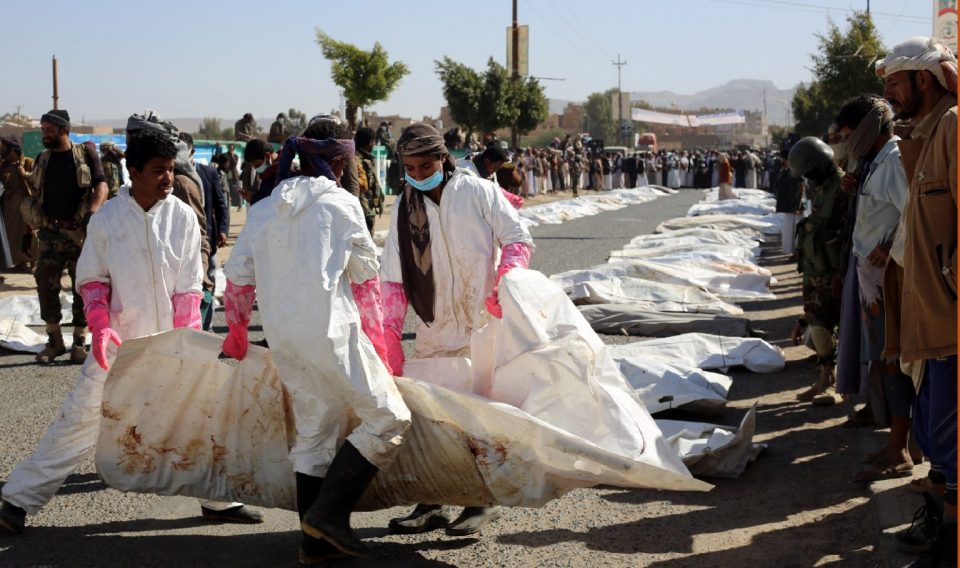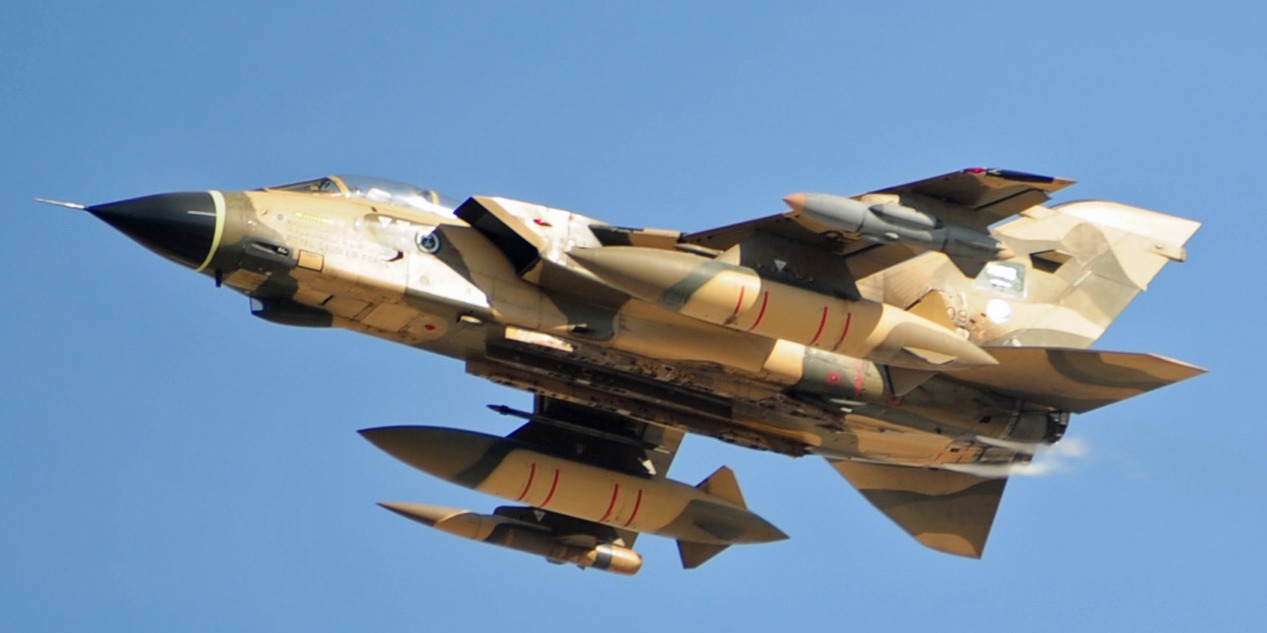Yemeni medical teams carry body bags containing corpses of those killed in a Saudi air strike on a prison in the northwestern city of Saada. (Photo: STR/AFP via Getty Images)
As Boris Johnson’s government galvanises international action to take Russia to the International Criminal Court over Ukraine, his officials are escaping accountability for their own complicity in violations of international humanitarian law.
The UK government has announced that it has “galvanised allies to refer atrocities in Ukraine to the International Criminal Court (ICC) in the Hague”, and “expedite an ICC investigation, through state party referral.”
Russia, in its war in Ukraine, is far from exceptional in targeting civilians and civilian infrastructure. Sadly, such behaviour is par for the course in warfare today.
Violations of International Humanitarian Law (IHL) – in particular the indiscriminate or even purposeful killing and maiming of civilians – have been a regular feature of armed conflicts in recent decades.
Impunity for violations of IHL and war crimes has become one of the most dire features of the international order, to the detriment of global stability and multilateralism. The violations are not just ignored but accepted and excused by some of the world’s most powerful countries, particularly those exporting arms to conflict zones.
Civilians in Syria, the Occupied Palestinian Territories and Yemen have been suffering the full horrors of impunity for war crimes with weapons made in Russia, Europe and the US for countless years.
The UK, along with a number of other European countries, is complicit in violations of IHL in the war in Yemen, now in its eighth year, though currently with a temporary truce in place.
Despite warnings from the very early stages of the war that IHL violations were occuring, arms exports from the UK, Spain, Italy, France and Germany to the Saudi Arabian-led coalition, and especially to the Saudi regime itself, have continued.
Some of these states have limited arms export licences to the Coalition. But the UK stands out for its unrivalled determination to maintain arms exports in the face of multiple legal, political and moral challenges.
Since the war in Yemen began in 2015 the UK has exported over £23 billion worth of arms to the Saudi-led Coalition.
In 2019 a coalition of European and Yemeni groups, including Campaign Against Arms Trade (CAAT), made a submission to the International Criminal Court. We asked them to investigate European government officials and arms company executives for potentially aiding and abetting war crimes in Yemen.
The submission argues that the economic and political actors involved in the arms trade bear criminal responsibility if they have knowledge that violations of IHL and war crimes are likely to have taken place, and are aware that export licences they approve or carry out may contribute to these violations.
The arms company executives referenced in the submission include those of BAE Systems and Raytheon UK, as well as European government ministers and officials.
The former UN Group of Eminent Experts on Yemen as well as numerous Yemeni and foreign NGOs have documented hundreds of cases of specific attacks.
These have been against residential areas, schools, hospitals, agricultural facilities, market places, gatherings such as weddings and funerals, and civilian factories, many of which have killed dozens of civilians, and where no military target has been in evidence nearby.
The attacks are violations of International Humanitarian Law, and may constitute war crimes.
There is also a strong case that Saudi Arabia has also been using starvation as a weapon of war, which would also be a war crime. In the midst of this horrendous humanitarian crisis, UK aid to Yemen has been slashed by 63% since 2020, despite the fact that people are starving.
Prosecutions
There is no clear jurisdictional route to prosecuting the direct perpetrators of the potential war crimes committed by the Coalition at this point in time, as neither Yemen nor the Saudi coalition members are party to the ICC.
To date the ICC has never opened a case involving a western European state. Communications to the ICC against corporate actors are rare, let alone investigations into their activities.
Bringing European economic and political actors before the ICC to investigate their potential involvement in alleged war crimes is a new avenue in the quest for justice. National law enforcement agencies have refused or are unwilling to address the complicity of European actors in these crimes.
These exports in question were licensed by high-ranking government officials who were made aware there was a strong likelihood these arms could be used to commit violations of international humanitarian law that may amount to war crimes.
A state’s failure to enforce relevant arms export control laws does not exempt companies from their responsibility to respect human rights and international humanitarian law.
The UN Guiding Principles for Business and Human Rights call on companies to take additional steps to carry human rights due diligence over the effects of their activities, and in no sector is this more urgently needed than in arms production.
Supplying weapons to the Yemen conflict is a flagrant example of non-compliance with international, regional and national export control law. These exports are contrary to provisions in the Arms Trade Treaty, the EU Common Position and UK domestic laws.
Pursuing accountability for crimes committed in Yemen will constitute a step towards closing this corporate impunity gap.
It’s important to highlight that the ICC is needed when national mechanisms – such as investigations and prosecutions – are not sufficient to achieve justice. CAAT first submitted an application for a judicial review of the government’s arms export licensing decisions in 2016.
The judgement by the Court of Appeal in June 2019 was a significant success. First, it forced the government to stop issuing new export licences.
Second, a UK court identified the government’s approach to deciding on export licences to Saudi Arabia as “irrational and therefore unlawful”, as it failed to properly assess the record of past violations of IHL by the Coalition.
The Court’s findings mean that UK arms companies were aware that the government was issuing licences unlawfully – yet they continued to export to the Coalition on existing licences unrestrained.
In July 2020, the government announced it had completed a review and found there were only a small number of “isolated incidents” of possible violations of IHL, and resumed new export licencing.
Many justified criticisms can be leveled at the ICC, including its limited resources and authority, and clear regional discrimination and political influence affecting which cases the Court opens investigations into.
However, in the face of so many atrocities globally we cannot be complacent about avenues for justice. CAAT’s legal case against the UK government shows that western governments will go to great lengths to ignore and deny their complicity in war crimes.
The ICC can offer some steps towards accountability for war crimes but its integrity rests on an equal pursuit of perpetrators, one which does not exclude the political allies of powerful Western states, or crucially, European states themselves.
DECLASSIFIED-UK


